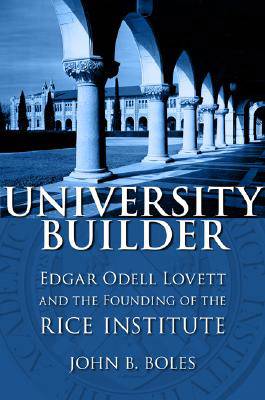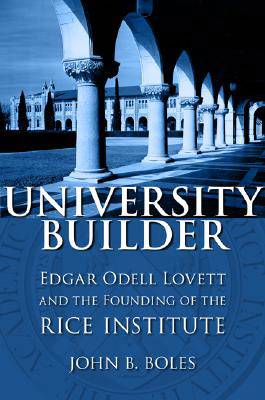
- Retrait gratuit dans votre magasin Club
- 7.000.000 titres dans notre catalogue
- Payer en toute sécurité
- Toujours un magasin près de chez vous
- Retrait gratuit dans votre magasin Club
- 7.000.000 titres dans notre catalogue
- Payer en toute sécurité
- Toujours un magasin près de chez vous
University Builder
Edgar Odell Lovett and the Founding of the Rice Institute
John B Boles
Livre relié | Anglais
76,45 €
+ 152 points
Description
Rice University, one of America's preeminent institutions of higher education, grew out of the vision, direction, and leadership of one man: Edgar Odell Lovett (1871-1957). University Builder is the fascinating story of this extraordinary educator and the unique school he created. Widely acknowledged, almost from its founding in 1912, as one of America's best universities, Rice is distinguished as both the smallest and the youngest institution in the top tier of American universities. In telling the tale of Lovett and his innovative, enduring vision for Rice, John Boles provides both a compelling biographical narrative and a refreshing new view of American higher education in the first half of the twentieth century.
Lovett was not a Texan; he was not even a southerner. Rather, with two Ph.D.'s in hand, he was a rising star at Princeton University when the trustees of the newly founded Rice Institute--chartered in 1891 by wealthy Houston merchant William Marsh Rice--called him in 1907 to be the school's first president. Working with a significant endowment, a vague charter, a supportive board, and a visionary's gift for planning, Lovett set out on a fact-finding tour of educational institutions around the globe. He transformed the idea of the Institute into a complete university, one that emphasized research as much as teaching and aspired to world-class status. He sought the best architect available to design the campus, lured distinguished faculty from leading universities across the globe to Texas, and constructed a far-reaching vision of a small, carefully planned, elite university that incorporated the most advanced educational practices and shaped Rice's development for the next century. Lovett served as president of Rice for nearly forty years, proving himself to be an exemplary and charismatic leader who inspired two generations of students. He was the creator of Rice University in practically every way. Indeed, perhaps no other American university has been so shaped by its founder's vision. Boles's exceptional account of Lovett's remarkable academic achievement is a vital contribution to the legacy of Rice University and an important addition to the historiography of education in the early twentieth-century South.Spécifications
Parties prenantes
- Auteur(s) :
- Editeur:
Contenu
- Nombre de pages :
- 344
- Langue:
- Anglais
Caractéristiques
- EAN:
- 9780807132753
- Date de parution :
- 01-12-07
- Format:
- Livre relié
- Format numérique:
- Genaaid
- Dimensions :
- 161 mm x 233 mm
- Poids :
- 635 g







